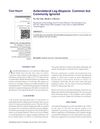Induction Plus Adjuvant Chemotherapy, Combined Treatment with Nimotuzumab, and Intensity-Modulated Radiation Therapy for N3 Stage Nasopharyngeal Carcinoma
December 2021
in “
Journal of Cancer Research and Therapeutics
”
TLDR The treatment improved survival and controlled cancer spread but required managing side effects like rashes.
The study evaluated a treatment regimen for stage N3M0 nasopharyngeal carcinoma involving induction chemotherapy, nimotuzumab, IMRT, and adjuvant chemotherapy with S-1 in 43 patients. It demonstrated high short-term efficacy with a 97.6% response rate and a 32.6% complete response rate. The 3-year locoregional control, overall survival, distant metastasis-free survival, and progression-free survival rates were 97.6%, 87.6%, 83.5%, and 81.0%, respectively. Neutropenia was the most common hematological toxicity, while hair loss and rashes were notable nonhematological toxicities. The regimen was effective in improving survival rates and controlling distant metastases, but managing toxicities, particularly rashes, was necessary. Further multicenter, randomized clinical trials were recommended to confirm these findings and explore the use of immunotherapy drugs.



